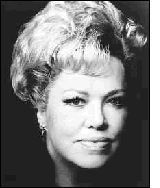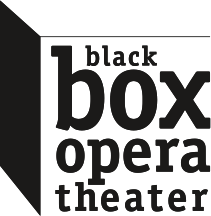(From her retrospective CD available from VAI Audio: Ellen Faull, An American Soprano)
One bit of advice occasionally dispensed by veteran singers to novices eager for success is that a singing career should be pursued only if the singer would die otherwise. While most who hear this wisdom view it as little more than hyperbole, for Ellen Faull it rings with a powerful note of truth. 
Born into a blue collar Pittsburgh family on October 14, 1918, Ellen Faull was the youngest of five children, only three of whom survived early childhood. Her childhood was troubled and isolated, made worse by her family's destitution brought on by the Depression. With the onset of adolescence, her difficulties ripened into deeply entrenched phobias which severely limited her activities and prevented her from attending high school until she was 18 years old.
Ms. Faull began to sing in early grade school. As early as 10 years old she was rewarded for her musicality when she was selected as soloist and section leader in her grade school choir. In the midst of all of her other difficulties, she continued to sing through her teen years. As she did, her sense of self, and her belief in life and its meaning and purpose, began to coalesce around her singing. It was this she believes, that helped her to risk, to put all that she was into her singing, and, ultimately, to succeed so brilliantly in her career as a singer.
When she was 16, she had the opportunity to sing for Mildred Lissfelt, a Pittsburgh vocal teacher and wife of a prominent music critic. It was through the patronage of the Lissfelts that Ellen Faull received her first voice lessons, was encouraged to attend the Curtis Institute in Philadelphia, and was introduced to Eugene Ormandy. Ormandy, who heard her sing at the Lissfelts' house, was so impressed with her artistry that he made his box available to her at all of the Philadelphia Orchestra concerts, and hired her to sing with the orchestra, while she was studying at Curtis.
After leaving Curtis, Ms. Faull moved to New York where she began to study with Joseph Regnas. In the spring of 1947 she auditioned for Erich Leinsdorf, who was seeking singers for work in Germany. Her audition, which occurred at New York City Opera, was overheard by City Opera staff who invited her to return to sing for the artistic director, Laszlo Halasz. She debuted as Donna Anna in Don Giovanni that fall, beginning her 35-year association with City Opera.
Ms. Faull initially won wide acclaim for her Mozart roles, such as Donna Anna, Countess Almaviva (Le Nozze di Figaro) , and Firordiligi (Così fan tutte). But, through the insistence of Halasz's successor, Julius Rudel, she expanded her repertoire to include such bel canto and verismo roles as Leonora (Il Trovatore) , Mimi (La Bohème) , Eva (Die Meistersinger) and the title roles in Madama Butterfly and Aïda. She portrayed Abigail in the premiere of Lizzie Borden, the mother in the premiere of Carrie Nation, and Lady Billows in the U.S. premiere of Albert Herring. Ms. Faull performed under the batons of many other notable conductors, including Kousevitsky, Serafin, Krips, DeSabata, Goldovsky, and, in a joint debut at San Francisco Opera, Georg Solti. She became one of the premier American opera singers, performing in opera houses all over the country, and was a frequent performer on nationwide Mutual Network radio broadcasts.
As her acclaim as a performer increased so did the call for her to teach. She began teaching at Sarah Lawrence College, then at the Manhattan School of Music, and, starting in 1980, she taught at the Julliard School of Music. Shortly after her arrival at Julliard, she became the chair of the voice department, a position she held until her departure in 1990. Her studio has included numerous singers who now have prominent national and international careers, including Faye Robinson, Veronica Villaroel, Jianyi Zhang, Hei-Kyung Hong, Dawn Upshaw, Gianna Rolandi, Michaela Gurevich, Juliana Rambaldi, Tracey Welborn, and Victor Benedetti.
It was at a post-performance party in 1951 that Ms. Faull met Dr. Maurice Gordon, a well known New York psychiatrist whom she married in 1954. It was out of their apartment on Central Park West in New York City that Ms. Faull maintained her vocal studio and Dr. Gordon maintained his practice, with their respective clients sharing the reception area.
In 1978 Ms Faull devoted herself to her teaching full-time. In 1990, she moved to Camas, Washington to be closer to her daughter, Judith, and now enjoys spending time with her infant twin granddaughters, Rachel and Sarah. In her 80s, and far from retirement, Ms. Faull has a full studio of vocal students, and maintains ongoing relationships with prior students who travel from all over the world to continue their work with her. In addition, she regularly accepts offers to provide master classes for students as well as for vocal teachers.
Ms. Faull firmly believes in, and continues, the tradition of patronage that made her own career possible, by generously dedicating her time and resources to young singers. In October of each year she funds and produces the Ellen Faull Gordon Vocal Competition, for singers who reside in the western United States. In 1992 she founded, and has continued to participate in, the Bel Canto Northwest Vocal Institute, held each summer at Portland State University in Portland, Oregon.
As evidenced in these recordings, Ellen Faull's soaring and crystalline voice carried her passionate spirit and unsurpassed vitality, making her a quintessential American opera singer. In most, this would be enough. But the legacy of Ellen Faull is more than her own voice; it lives in the voices of singers who, through her teaching and patronage, are now performing in opera houses and concert halls around the world. Ellen Faull has dedicated herself to the craft which saved her life.

Born into a blue collar Pittsburgh family on October 14, 1918, Ellen Faull was the youngest of five children, only three of whom survived early childhood. Her childhood was troubled and isolated, made worse by her family's destitution brought on by the Depression. With the onset of adolescence, her difficulties ripened into deeply entrenched phobias which severely limited her activities and prevented her from attending high school until she was 18 years old.
Ms. Faull began to sing in early grade school. As early as 10 years old she was rewarded for her musicality when she was selected as soloist and section leader in her grade school choir. In the midst of all of her other difficulties, she continued to sing through her teen years. As she did, her sense of self, and her belief in life and its meaning and purpose, began to coalesce around her singing. It was this she believes, that helped her to risk, to put all that she was into her singing, and, ultimately, to succeed so brilliantly in her career as a singer.
When she was 16, she had the opportunity to sing for Mildred Lissfelt, a Pittsburgh vocal teacher and wife of a prominent music critic. It was through the patronage of the Lissfelts that Ellen Faull received her first voice lessons, was encouraged to attend the Curtis Institute in Philadelphia, and was introduced to Eugene Ormandy. Ormandy, who heard her sing at the Lissfelts' house, was so impressed with her artistry that he made his box available to her at all of the Philadelphia Orchestra concerts, and hired her to sing with the orchestra, while she was studying at Curtis.
After leaving Curtis, Ms. Faull moved to New York where she began to study with Joseph Regnas. In the spring of 1947 she auditioned for Erich Leinsdorf, who was seeking singers for work in Germany. Her audition, which occurred at New York City Opera, was overheard by City Opera staff who invited her to return to sing for the artistic director, Laszlo Halasz. She debuted as Donna Anna in Don Giovanni that fall, beginning her 35-year association with City Opera.
Ms. Faull initially won wide acclaim for her Mozart roles, such as Donna Anna, Countess Almaviva (Le Nozze di Figaro) , and Firordiligi (Così fan tutte). But, through the insistence of Halasz's successor, Julius Rudel, she expanded her repertoire to include such bel canto and verismo roles as Leonora (Il Trovatore) , Mimi (La Bohème) , Eva (Die Meistersinger) and the title roles in Madama Butterfly and Aïda. She portrayed Abigail in the premiere of Lizzie Borden, the mother in the premiere of Carrie Nation, and Lady Billows in the U.S. premiere of Albert Herring. Ms. Faull performed under the batons of many other notable conductors, including Kousevitsky, Serafin, Krips, DeSabata, Goldovsky, and, in a joint debut at San Francisco Opera, Georg Solti. She became one of the premier American opera singers, performing in opera houses all over the country, and was a frequent performer on nationwide Mutual Network radio broadcasts.
As her acclaim as a performer increased so did the call for her to teach. She began teaching at Sarah Lawrence College, then at the Manhattan School of Music, and, starting in 1980, she taught at the Julliard School of Music. Shortly after her arrival at Julliard, she became the chair of the voice department, a position she held until her departure in 1990. Her studio has included numerous singers who now have prominent national and international careers, including Faye Robinson, Veronica Villaroel, Jianyi Zhang, Hei-Kyung Hong, Dawn Upshaw, Gianna Rolandi, Michaela Gurevich, Juliana Rambaldi, Tracey Welborn, and Victor Benedetti.
It was at a post-performance party in 1951 that Ms. Faull met Dr. Maurice Gordon, a well known New York psychiatrist whom she married in 1954. It was out of their apartment on Central Park West in New York City that Ms. Faull maintained her vocal studio and Dr. Gordon maintained his practice, with their respective clients sharing the reception area.
In 1978 Ms Faull devoted herself to her teaching full-time. In 1990, she moved to Camas, Washington to be closer to her daughter, Judith, and now enjoys spending time with her infant twin granddaughters, Rachel and Sarah. In her 80s, and far from retirement, Ms. Faull has a full studio of vocal students, and maintains ongoing relationships with prior students who travel from all over the world to continue their work with her. In addition, she regularly accepts offers to provide master classes for students as well as for vocal teachers.
Ms. Faull firmly believes in, and continues, the tradition of patronage that made her own career possible, by generously dedicating her time and resources to young singers. In October of each year she funds and produces the Ellen Faull Gordon Vocal Competition, for singers who reside in the western United States. In 1992 she founded, and has continued to participate in, the Bel Canto Northwest Vocal Institute, held each summer at Portland State University in Portland, Oregon.
As evidenced in these recordings, Ellen Faull's soaring and crystalline voice carried her passionate spirit and unsurpassed vitality, making her a quintessential American opera singer. In most, this would be enough. But the legacy of Ellen Faull is more than her own voice; it lives in the voices of singers who, through her teaching and patronage, are now performing in opera houses and concert halls around the world. Ellen Faull has dedicated herself to the craft which saved her life.


